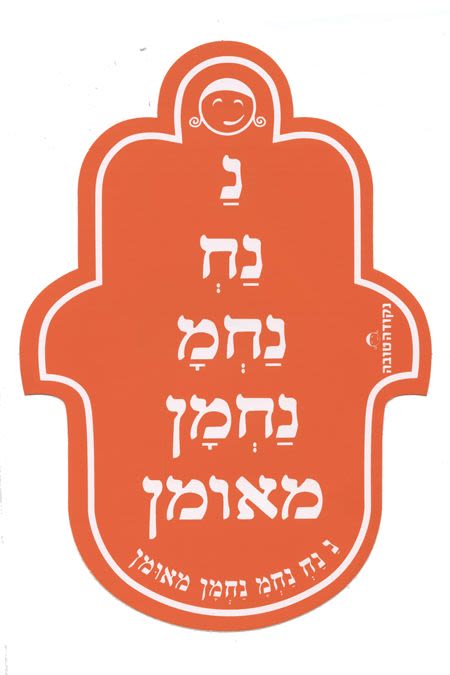
The Hardest Test
Did you ever feel that your fervent prayers were not accepted? You put all your hopes in this prayer and turned to Hashem with unbridled faith that He wants to save you, and then...nothing! A MUST READ!

What Breaks You?
It was the tenth phone call he made that day, and, once again, the answer was negative. Yigal was under a lot of pressure. Free loan societies, banks, and credit companies refused to grant him his request and would not authorize the loan he needed so much. He really did not want to involve Tzion, his good – and wealthy – friend, but there was no other choice, and reluctantly, he called the familiar number.
Tzion answered him cheerfully, as usual. They asked as to each other’s welfare, but when Yigal brought up the reason for his phone call, there was silence. Tzion then began to apologize weakly, muttering excuses and evasive phrases. Yigal thanked him politely and ended the conversation.
That night, Yigal found it hard to fall asleep. He ran through that conversation with Tzion again and again, his heart filling with feelings of insult, anger, and frustration. He understood that he had no reason to be angry with Tzion, but he was angry, very angry.
After lying in bed, sleepless, for a long time, he got out of bed, made himself a cup of tea and went to sit on the porch, trying to organize his thoughts.
“Why am I so hurt? What am I so angry about? Why can’t I stop thinking about that conversation?” he asked himself. He remembered immediately that on that day he had received many negative answers. But no refusal of help had affected his peace of mind nor caused such powerful feelings – only Tzion’s refusal.
And then he understood…
He understood that the greater the expectations, the greater the disappointment.
He hadn’t had high hopes in regard to the banks and the free loan societies. He had just cast his line – it couldn’t hurt to try. When it failed, he was disappointed, of course, but it wasn’t a significant disappointment. But when he heard that same refusal from a friend who is like a brother to him – that broke him; it was very hard for him to cope with such a disappointment.
The Heart Aches
There is nothing harder in life than disappointment. Deep and hard disappointment undermines a person’s emotional stability. “A drawn-out hope brings sickness of heart.” And as we have written repeatedly – the soul is the emuna (faith) and the emuna is the soul. And therefore, the test of disappointment is the hardest test of emuna!
And one of the most difficult disappointments to take is a prayer not being accepted! When a person prays, he places all his hopes in this prayer. He turns to Hashem with the unbridled faith that Hashem wants to save him – and when he is not answered, he experiences unmatched emotional difficulties, as the Gemara says, he experiences “pain in the heart.”
All the familiar and comforting sayings about emuna – “Hashem loves me,” “Hashem hears all prayers,” “I am good,” “Everything is for the best,” “Any delay is for the best” – all these lose their power, and a person develops feelings completely opposite of those of faith. And here too, the greater the person’s faith in prayer, the greater the disappointment.
Why Have You Done Evil?
This nisayon is so difficult, that even very great people might fail it, according to their spiritual level. Who is greater than Moshe Rabbeinu? And who are we to judge that man of G-d, when even if we lived a billion years, we would not be able understand who Moshe Rabbeinu was? But our holy Sages already taught us that Moshe had a similar test: Hashem met him in the desert, in the scene with the sneh (bush). He brought him good tidings that Moshe had been praying and waiting for: “I am about to redeem the Jewish People!” The people, too, were yearning for redemption. Moshe arrived in Egypt happily and the people believed him and were enthusiastic. Everyone expected that from now on the process would just accelerate.
But what happens then? Suddenly Moshe disappears. The situation just gets worse and worse. The suffering, which was already impossible, reaches inhuman levels. The people are disappointed and angry with Moshe, but Moshe Rabbeinu is ten times more disappointed. “But, Hashem, you said to me… I didn’t expect You to do that…” and out of deep disappointment and distress, Moshe cries out: “Why have You done evil to this people? Why have You sent me? And since I came to Pharaoh to speak in your name, he did evil to this people, but You did not rescue Your people.”
These are harsh words! He accuses Hashem with an accusation that contradictory to emuna! Chazal say that back then, already, it was decreed that Moshe would not enter the Land, and therefore this week’s parasha begins with the words, “And Elokim spoke to Moshe”. Not Hashem – which symbolizes the midda (trait) of mercy, but Elokim – which represents the midda of strict justice, because Moshe Rabbeinu had brought upon himself the midda of strict justice.
If holy Chazal had not said these things, we would not have dared to think such thoughts about Moshe Rabbeinu, but Chazal wanted to teach us a lesson. They want us to know that the test of disappointment is so great that even great, righteous and holy people found it hard to pass it with the highest mark.
And the message is, of course, aimed at us. That we should know to prepare ourselves and learn how to handle the test of disappointment correctly.
I, Hashem, Have Not Changed
So, how does one handle that test?
Disappointment makes us understand what emuna really is. If emuna applies only when life is pleasant – that is not emuna. Emuna is not equal to understanding. Emuna is unconditional, internal knowledge, a deep vision regarding the essence of how the Creator runs the entire universe, even when one doesn’t understand and doesn’t see it with one’s eyes.
Emuna is also not a feeling. We do not always feel that Hashem loves us – but we believe that Hashem loves us. If faith were just a feeling, then indeed, after the disappointment, the feeling would weaken, and that is the explanation as to why people who experience disappointment lose their faith. But faith is not a feeling; rather, it is a deep knowledge in the depths of our souls that the Creator is good, whether we see it or not.
And the most important rule is: Emuna doesn’t change!
Emuna doesn’t change in any condition or situation. That same loving and merciful Hashem Who was with you in times of success is with you in times of failure as well, and He loves you and is merciful towards you to the same degree. That same Hashem that loves you when things are good, loves you to the same degree when things feel bad. That same Hashem Who wants to give and shower you with good when you feel the abundance, that is the same Hashem Who wants to give and shower you with abundance when you feel a lack or when your prayers are not answered.
Netzach Yisrael Will Not Lie Nor Change His Mind
That same Hashem Who accepts prayers when you see the salvation – is the Hashem Who accepts prayers when the salvation fails to come immediately, and also when you do not understand and do not see how the prayer was accepted.
Emuna is still valid even when the prayer has not been answered to our satisfaction. We believe that it has surely been accepted, but we do not see and we do not understand – but we believe! We simply know that it is so, and nothing will change that knowledge.
And therefore, the passuk finishes up by saying, “Elokim (strict justice) spoke to Moshe and said to him ‘I am Hashem (mercy).’” Even when you do not see My mercy – I am Hashem. My mercy always exists; My love always flows out. It does not change and will never change. And Moshe had this knowledge during all the times that he prayed for the Jewish people and saved them from being annihilated. He always believed that in spite of all the sins, the love that Hashem loves the Jewish people does not change and will never change.
In the previous parasha we wrote that the two fundamentals – the knowledge that Hashem loves you and the knowledge that you are good and want only good – are the preparation for the third fundamental, which is our ability to pray in length until we can bring about complete redemptions.
But when a person goes the way of prayer, the greatest danger is the waiting, the fact that not everything is received immediately, the way we understand things; that sometimes one has to pray for days and years before one gets what one wants – and then the emuna in the first two basic fundamental becomes unstable, and one stops praying.
Therefore, the time to reinforce yourself regarding the first two fundamentals is after you have prayed – that is the time to reinforce your belief in the first two fundamentals and to do what Chazal say, “Hope to Hashem,” and then, immediately, “strengthen yourself” – in the basics of emuna, so that you will be able to once again “hope to Hashem”, because, no matter what, “I am Hashem.”












2/03/2023
This’ nothing but the utmost truth. I am in a similar situation, experiencing excruciating disappointments expecting to come out of debt trap but instead my situation keeps on worsening even the more I lift my prayers to Hashem and I was almost at the verge of giving up now that this taumenting situation which has persisted for (3) three years now.
Thank God for the journey of Emuna that has helped me stay especially this year which has been very testing to the level where I have questioned whether Hashem has forgotten about me or not.